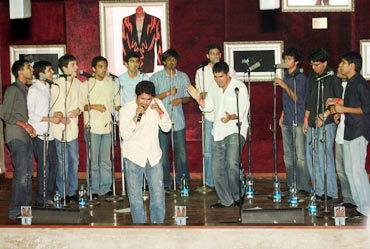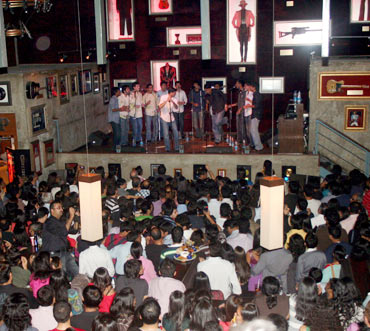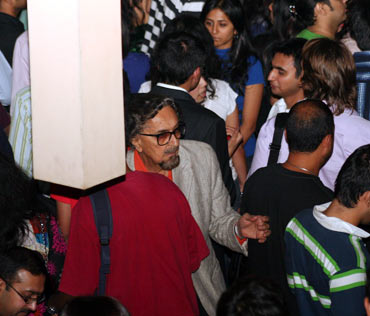
Desi students Indianise the a capella. Matthew Schneeberger reports.
A lot can change in a decade.
In 1998, three-year-old Hindi a capella group Penn Masala had begun to make a small name for itself, but almost exclusively within the North American desi community.
Though they'd already mastered their trademark style -- a unique mishmash of different types of music, including Indian film songs, Western pop, R&B and hip hop and Indian classical, with only vocals for instrumentation -- they were still a relatively unknown entity, outside of 'brown' Americans.
"In the beginning, definitely, our initial fans were South Asians living in the US," says Kunal Bajaj, one of the group's founding members.
In 1996, Bajaj and four others, freshmen at the University of Pennsylvania, created the group almost on a whim, and saw their South Asian heritage as a way to make them stick out from the numerous a capella groups already established on campus. Never did they imagine Penn Masala would become an international brand in less than 10 years.
Fast forward to October 2008: Penn Masala was in the White House for Diwali celebrations, performing for US President Barack Obama.
"The White House experience was a unique combination of both South Asian and American cultures," says Ankit Dhir, a 21-year-old senior at U Penn's Wharton School of Business and Penn Masala's current president. "It was totally humbling and a huge honour to perform for the President."
The symbolic moment captured the group's rise. They've traveled the length and breadth of the United States, performing in college towns and concert halls, at small functions and international awards shows. They've released six full-length CDs, including their most recent, No Detours, and their music is available on iTunes. Perhaps most importantly, the group is breaking into the mainstream.
"Today, audiences are often 50, 60, 70 percent non-South Asian. It's amazing," says Bajaj, who now lives and works in New Delhi.
He and co-founder Naveen Wadhera agree that the band truly took off in 1999. That year, they released their first CD, Awaaz, and went to London, where they gave a well-received performance on BBC Radio. In 2000, they performed in New York City's Nassau Coliseum at the Zee Gold Bollywood Awards, and haven't looked back since.

This month the group is touring India, for the third time ever, as part of its World Tour 2010. Public performances in Delhi, Mumbai and Hyderabad are on the cards, along with a private performance for Reliance Industries chairman Mukesh Ambani. Britain is next, with stops in London and Cambridge in March.
"We love coming back to India, because everyone's so into the music," says Dhir, who moved from Delhi to Pittsburgh at age six. "The venues and the press exposure have been incredible," he adds.
Many of the members, including Dhir, grew up training for both Indian and Western singing traditions. "I've always loved both types of music, and wanted to somehow combine them. So Penn Masala was perfect for me. A lot of the other guys feel the same," he says. "We're performing the type of music we've always loved to listen to and sing. But if I had to put a number to it, I'd say 65 percent of our music is Indian."
It should serve as no surprise, then, to observe the group effortlessly segue from U2's With Or Without You to Vande Mataram. Many of their songs are medleys -- partly a cover of a well-known English song, and partly a cover of an Indian song, often a Bollywood hit, all done in a capella style.
"We've always done fusion music. We wanted to identify with the South Asian experience in America, which necessarily involves a mixture of two cultures. For many of us, who grew up in the States, it was a unique way to honour our heritage and learn more about it, all while simultaneously having a great time," says Wadhera, one of the original five. He, like Bajaj, has chosen to relocate to India, where he lives and works in Mumbai.
Like their music, the group's 13 current members represent the entire spectrum of Desi America. Two were born and raised in India, and now attend the University of Pennsylvania. Others were born in India or in the US, but have shuttled back and forth between the two countries. Still others have only been to India once or twice.
With Wadhera, Bajaj and others as examples, the current members aren't at all opposed to working in India, once they graduate. Akshat Vaidya, from Austin, Texas, says he can see himself working in India, especially in the public sector. "The number of opportunities in India continues to grow, so I think it makes sense for most of us to do at least a stint here," he says.
And then there's Sam Levenson, a Jewish American from Boston, the group's lone foreigner. While he knew precious little about India and Indian culture when he signed up, today he feels fully accepted into the flock. "You don't have to be brown to audition," he quips. "There's not another group I'd rather be a part of."
They're mostly finance guys, future investment bankers, with a few pre-meds and engineers. But, make no mistake: they know how to have fun. And, despite their success, they're normal US university goers, and speak in the American college culture's distinct and mysterious dialect. In between rehearsals, sound-checks and the actual performance in Mumbai, many of the members were checking US football scores and news on their laptops.
As for the concert, to call it a smashing success would be an understatement. An hour before showtime, Mumbai's Hard Rock Cafe, capacity 1,000, was full. And 300 others were left ticketless outside, unable to get in, for safety reasons. A few celebrities, including 1999 Ms India Gul Panag, were in attendance.
As was Malini Agarwal, Mumbai-based RJ and party girl, who says of the performance, "I loved it! They are superbly talented, great guys. (They) represent the new face of American desis -- who have found a way to keep India, through Bollywood and its melodies, close to their hearts!"
"The crowd was absolutely amazing," says Dhir. "The performance was a whole lot of fun."
For Dhir, who will be graduating this May, these last few months in the group obviously hold a great deal of meaning. "My one year as president is almost up. Time for someone new. In a way, it's sad, but I know that all of us alumni and current members -- we're like brothers. It's a very tight group. If we weren't, with as much as we travel together, we'd kill each other!" he says, laughing.